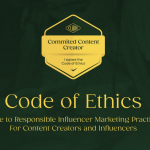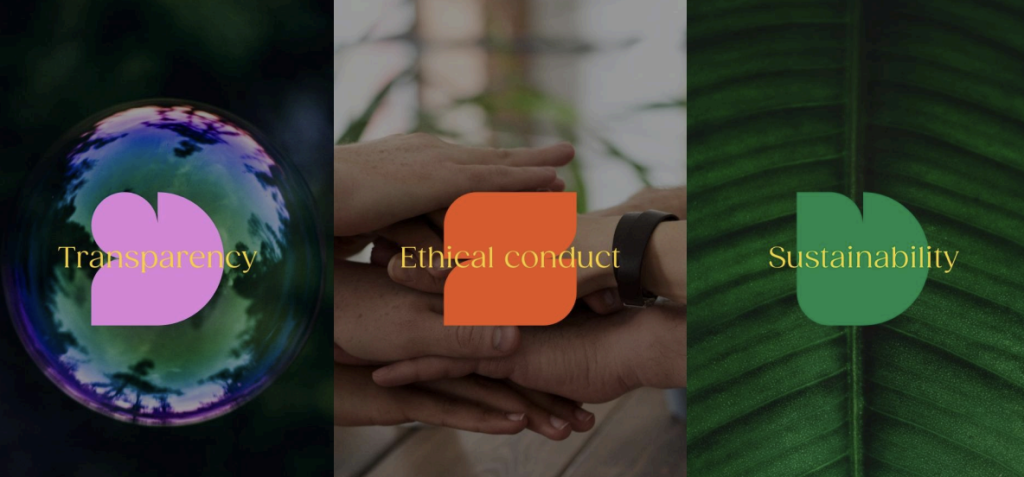 We all know that advertising is about influencing consumer behaviour. In Canada, the industry has been self-regulating since Advertising Standards Canada was created in 1957. But there’s a widespread perception that integrity is hard to find in the Wild West of social media marketing. Why? In a word, influencers.
We all know that advertising is about influencing consumer behaviour. In Canada, the industry has been self-regulating since Advertising Standards Canada was created in 1957. But there’s a widespread perception that integrity is hard to find in the Wild West of social media marketing. Why? In a word, influencers.
How do you (or your kids) know that a celebrity endorsement is authentic? Does the hot girl or guy with a million followers really use that product? Is the content creator with a big smile and loud voice just in it for the paycheque?
At Clark Influence, we are solving the influencer issue by developing a gold standard for the entire industry.
Why a Code of Ethics? It’s All About Trust.
Are you rolling your eyes or shaking your head at the idea that ethics can ever apply to social media content? Okay, we get it. But it’s in everyone’s interest to elevate standards. We’re consumers too, and we’d like to trust what we see when we scroll. And as an industry leader, Clark works with major brands who want to reach people in their feeds but who also need to minimize brand risk while getting the biggest bang for their buck.
We were excited to craft a document that would ensure a win-win-win scenario for the general public,advertisers, and the influencers themselves. If we could get this right, the few bad apples would be thrown out of the influencer barrel for good!
Why should influencers care enough to sign?
Clark only works with professional content creators – people who care about building a solid online presence and maintaining a career doing what they love. Signing the Code of Ethics should be a badge of honour. But to make the Code even more compelling, it features a series of no-brainer questions alongside fun imagery, like: Would you catfish on a date? Would you marry a total stranger? and Would you ask a gardener for hairdressing advice?
How did we decide on the Code’s content?
Last year, we set ourselves a goal: to bring multiple perspectives to the task of making content creation and influencer marketing more ethical. We achieved that goal by setting up a steering committee that then collaborated in determining the key elements that would form a guide to responsible influencer marketing practices.
The three main principles that form the Code’s framework are:
- Transparency
- Ethical conduct
- Sustainability
Let’s take a look at each of these principles in turn.
Transparency: Beyond the #ad hashtag
Influencers pledge to be open about paid partnerships by using prominent labels like #ad or #sponsored.
They also agree to be as natural as possible and authentically themselves by avoiding the overuse of filters or special effects.
This authenticity also applies to their follower communities, which must grow organically without artificially inflating their subscriber or engagement counts.
Finally, the influencer undertakes to maintain a balance between sponsored and non-sponsored content.
The goal is to build business bridges, not blaring billboards.
Ethical conduct: Don’t be a d*ick!
Influencers have an obligation to be loyal to the brands they collaborate with. This entails refraining from promoting competing products or services within the same industry, particularly in the week leading up to and following a campaign.
Ideally, the influencer should avoid simultaneous advertising for different clients on the same day, even in the absence of a conflict of interest. Signatories also agree not to misrepresent the qualities of the brand’s products or services by testing them before recommending them.
Nobody likes to have their work stolen. Creators pledge to respect copyrighted work and the intellectual property of others, whether it be audio, words, or images. Finally, influencers must never publish disparaging, offensive, or harmful content. Being positive and inclusive makes everyone shine!
Sustainability: Putting planet before profit (or popularity)
We are asking influencers to minimize their carbon footprints through responsible practices such as limiting unnecessary travel, rejecting excess product gifting, and prioritizing partnerships with eco-conscious brands offering sustainable options.
Even when it comes to choosing which products they showcase on their feeds, they are encouraged to promote brands and services that offer reasonable alternatives to rampant consumption (small collections, upcycled and recycled materials, eco-friendly materials, and 100% certified materials).
It’s up to the content creator and agencies to research supply chains and manufacturing claims as much as possible. A sustainable mindset means taking personal responsibility, whether you are an influencer or agency representative.
This collaborative Code makes everyone a winner
At Clark, we believe that influencer marketing should be a collaborative effort. Our Code creates a win-win-win scenario:
- Influencers connect with ethical brands that align with their values and build stronger relationships with their audience
- Brands gain access to a network of trustworthy influencers who can authentically represent their products and services
- Consumers experience a more transparent and responsible online space, where they can make informed decisions based on genuine recommendations
An additional overarching benefit for influencers who act more ethically: their work will be perceived in a more positive light (a plus for their personal brands), while the industry as a whole will thrive through the adoption of higher standards.
The Code of Ethics is designed to evolve
Clark’s Code of Ethics isn’t just a document; it’s a vision for the future of influencer marketing. If you are a media outlet, Clark Influence welcomes interview opportunities to discuss the Code’s significance and its impact on the industry. And if you’re a brand manager or CMO, we would love to hear what you think about the Code.
Protecting the public, promoting brand safety, and encouraging sustainable practices are at the heart of this bold initiative. Let’s kick off the conversation and make social media a better online environment.
Who says online entertainment and ethics can’t mix?
- Nicolas Bon



